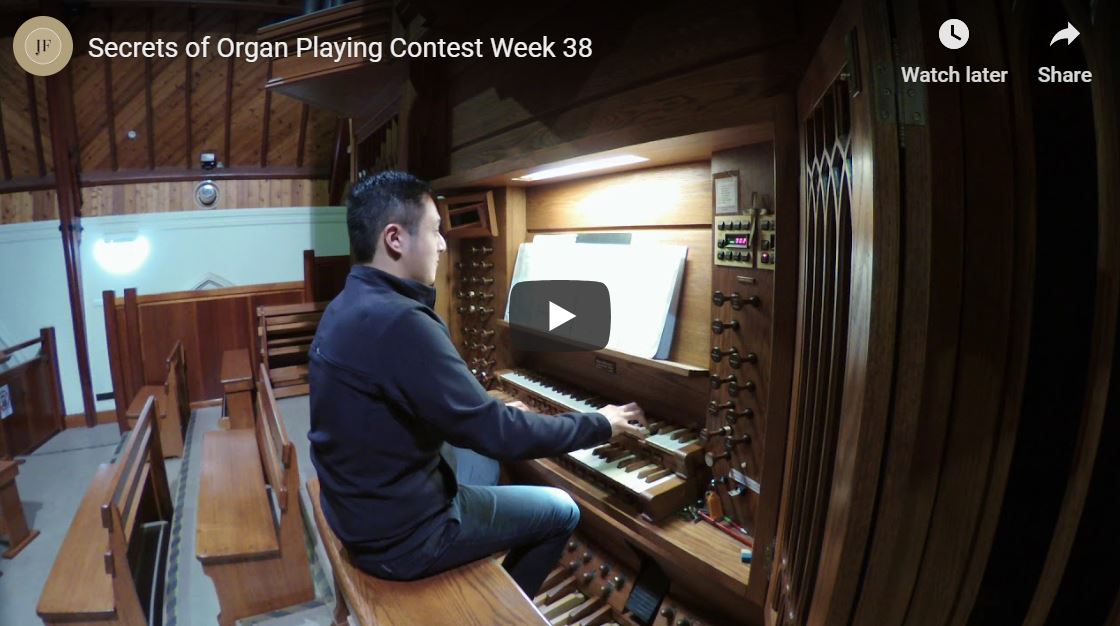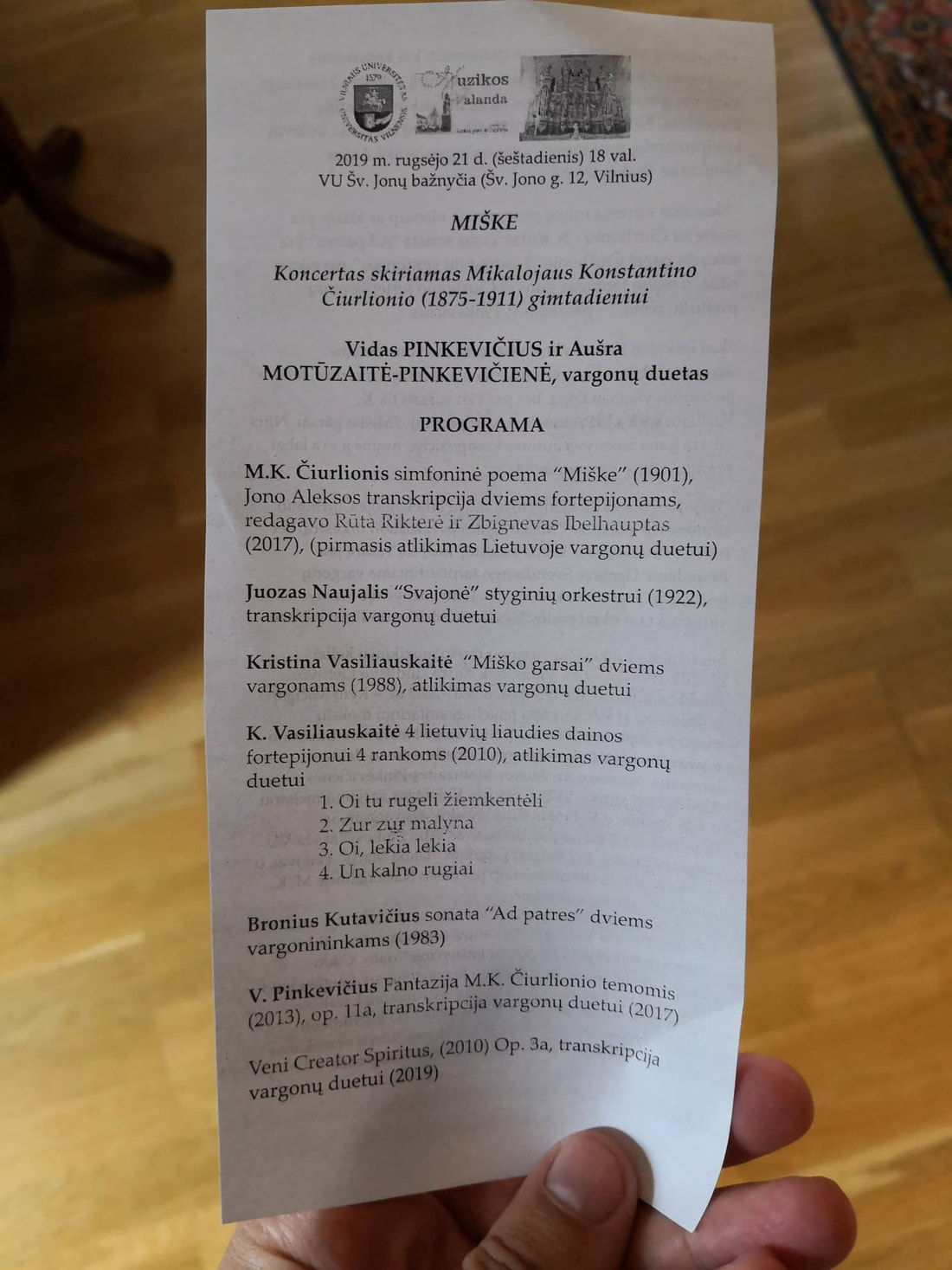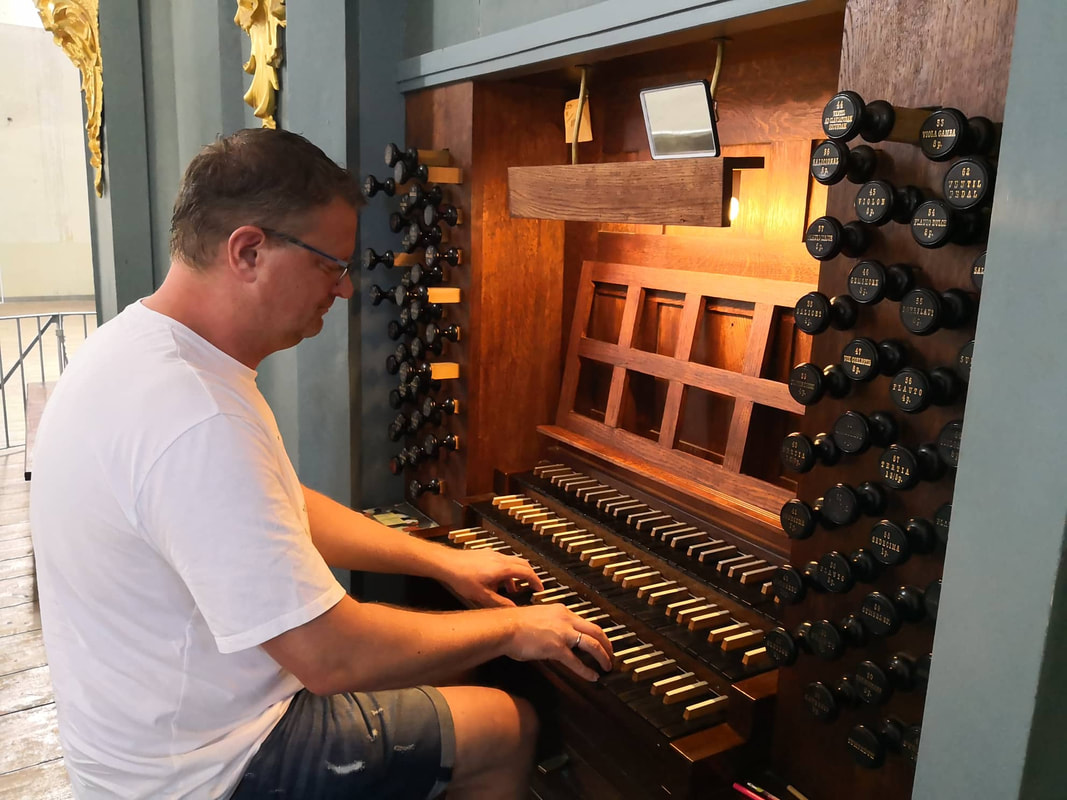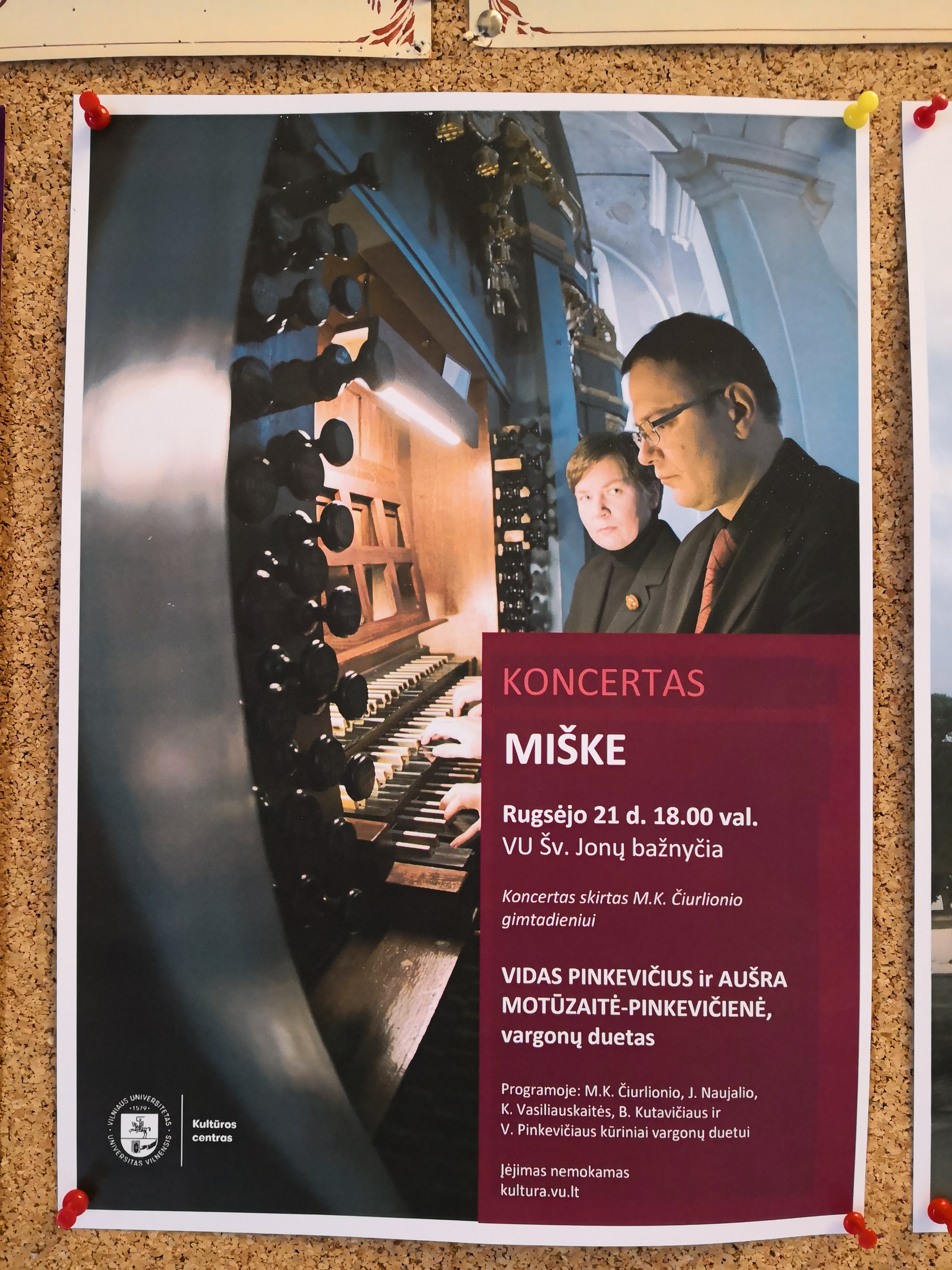|
Vidas: Hi guys, this is Vidas!
Ausra: And Ausra! V: Let’s start episode 492 of Secrets of Organ Playing Podcast. This question was sent by Ruth, who is our Total Organist student. She wrote: “I wonder what are the best ways for teaching new hymns. I am also the pastor. So, I have had some choice in the hymns. I wonder, though, how others teach new hymns. And, which ones have been loved by your congregations? Have some choices been a surprise?” I guess it would be wonderful for our community to jump in and leave some feedback about hymns; how they teach new hymns, and what the communities/congregations love the most. A: I think this is, in general, a very important question, and I think it touches many church musicians, because it’s a number one issue, about how to choose hymns, how to sing hymns, how to teach new hymns. V: I had an experience in teaching new hymns at our St. John’s Church, but a long time ago, when we were both regular organists. You would play the organ… A. True. And you would conduct the congregation from downstairs. V: It’s a two person work, then, like a teamwork. A: But, if you know you don’t have such a large church building as ours and as St. Johns’, and maybe you have some sort of keyboard downstairs. You could use it. I think that would be an idea. Maybe your organ is upstairs, but maybe your piano is downstairs. V: Yes. And the piano, maybe, is in the visible place where people could see you. Some places you could even move the piano closer to the center during the rehearsal. I just had this podcast conversation with Andreas Spahn, organist from Germany. He is a church musician. But, as I understood, he has these organ or choir rehearsals with the congregation, but they’re not long. They are just three or five minutes long, before the service starts. I thought, “Why is he doing them so short? Why not 15 minutes, like we would do.” It appears that people are gathering at the church at the last moment, and there are not many people 15 minutes before the service. A: Sure, time is money, so… everybody is counting. V: Everybody is making money on Sunday morning. A: Well… V: Yeah… well, hopefully, this approach is really applicable for a lot of situations. Not only for new hymns, but maybe old hymns that have been forgotten and need to be resurrected. How would you, Ausra, conduct this rehearsal, if you had to choose. A: Well, I would just go through each line. V: How many hymns? A: Well, I think for such a rehearsal you may do only one thing. So, basically, if you are leading a service, I wouldn’t choose all new hymns. You can only introduce one new hymn per service. V: Why not two? A: It might be too difficult—too much new information. V: You’re right. Does it matter where this new hymn comes in the service? In the beginning? Middle? End? A: I don’t think it’s so important. But, of course, if you just rehearse before the rehearsal, then it really would be an opening hymn, right from the rehearsal to performance. V: Is it okay if I did a rehearsal when I first sang the first verse, and then asked them to repeat phrase by phrase, line by line? A: Yes, I think it’s nice. It should work. But, I think it’s also important that you would sing all verses that you are intending to sing during the service, because for me, the biggest problem is to do the second, the third and the other verses. Because usually, what you have in some hymnals, at least in Lithuania, is that you have the first verse written underneath the score, and it’s very convenient, because you see the music and the words together. But other verses, they are written below the page after the score is finished. So, it’s not so comfortable to do it, because you have to still look at the music, especially if you are accompanying yourself, and then to be able to follow the words. V: You’re right. I think in Western hymnals, they have three or four verses written under the notes. A: But still, it’s not as comfortable to see them, to follow them as the first verse. V: Yeah. That’s right. So, basically, go through each verse, and then this melody will sing by itself, probably, into their memory. A: True! Plus, I think a lot of success also depends on the meter of the hymn. If it has a regular meter, strong beats in every measure, then it makes life easier. But if you choose something based on Gregorian chant, or sort of modal, also based on modes, that might not be as easy to sing for a congregation, because I think rhythm is crucial for congregational singing. So I would suggest maybe just to avoid such hymns. V: I think this might work, too. A: You also need to include your choir into your rehearsals. That might be a big help for you and for your congregation. And I remember that what else you could do, of course, the choir might show an example of that unfamiliar hymn for a congregation, but later on during the service, you might spread your choir throughout your congregation. Let’s say you have 20 choir members, and you have a hundred rows in the church. You might divide your choir members between those rows, that you might help your congregation to sing better. I think this might work, too. V: This is really a clever idea, and it has been done before, and usually the congregation feels more confident when there are people around them singing with confidence. A: So you might try that, as well. V: Do choir members have to be dressed like civilians or in robes? A: I don’t think it’s important. It’s up to the tradition, so… V: Concealed! They have to conceal themselves. A: Not necessarily, I think. V: If they are members of the congregation, people will recognize them, anyway. A: But anyway, I think it’s a wise solution to listen to the service from downstairs, even for an organist or music director, because that way, you might notice and listen to members of your congregation who sing very well, and that might be a possibility to choose new members of the choir. So, anyway… V: Good idea. Ok guys, we hope this was useful to you. Please send us more of your questions; we love helping you grow. And remember, when you practice, A: Miracles happen.
Comments
Thank you everyone for participating! You all made us very happy with your entries. We'd like to thank our guest judge @partitura who has selected the following winners which you can congratulate here.
Have you ever wanted to start to practice on the organ but found yourself sidetracked after a few days? Apparently your inner motivation wasn't enough.
I know how you feel. I also was stuck many times. What helped me was to find some external motivation as well. In order for you to advance your organ playing skills and help you motivate to practice, my wife Ausra - @laputis and I invite you to join in a contest to submit your organ music and win some Steem. Are you an experienced organist? You can participate easily. Are you a beginner? No problem. This contest is open to every organ music loving Steemian. Here are the rules LIVE Recital for Organ Duet Works by M.K. Ciurlionis, J. Naujalis, K. Vasiliauskaite, B. Kutavicius9/22/2019 For yesterday's organ duet recital @laputis and I decided to put a camera above the keyboards because we had 2 assistants who would have obstructed the view had the camera been placed from the side. A few minutes before we started playing, I came to the organ bench and positioned the camera on the light above music rack. I also life-streamed it to Facebook. Afterwards I downloaded the video to my phone and uploaded it to cross-posted to YouTube and that's what I'm going to share with you today. PROGRAM: Mikalojus Konstantinas Ciurlionis (1875-1911) Symphonic Poem "In the Forest" (1901) arrangement for organ duet Juozas Naujalis (1869-1934) "Reverie" (1922) arrangement for organ duet Kristina Vasiliauskaite (b. 1956) Sounds of the Forest (1988) for two organs K. Vasiliauskaite Four Lithuanian folk songs (2010), arrangement for organ duet
Vidas Pinkevicius (b. 1976) Fantasy on the themes by Ciurlionis, Op. 11a (2013/2017) arrangement for organ duet V. Pinkevicius "Veni Creator Spiritus", Op. 3a (2010/2019) arrangement for organ duet @laputis and I would like to sincerely thank our last night's assistants, excellent and talented organists Eglė Rudokaitė and Audra Telksnytė for masterfully changing the stops and turning pages on the largest pipe organ in Lithuania and making our recital such a success. They both deserve to sit on the benches of the most interesting organs in the world more often! Also thank you everyone who came to listen to us in the church and to those who watched the life-stream on FB! We appreciate your attention more than you know... If you want, you can compare it to our playing in Svendborg, Denmark at the end of July. Composer Kristina Vasiliauskaite, who came up to us after the recital yesterday had listened to this video previously too and she said her 4 songs sounded much better at St John's church with its acoustical environment and of course the character of the instrument. Ausra and I are hoping K. Vasiliauskaite will create something for organ duet in the not too distant future as well...
Vidas: I'm here with Andreas Spahn from Germany whom I met last Thursday at Vilnius Cathedral during the recital of Lithuanian organist Balys Vaitkus, but before that Andreas contacted be via email asking about the opportunity to hear me play because his son is going to start studying at Vilnius University Medicine Department. So I mentioned him that recital at Vilnius Cathedral and he came - it was a big surprise to me last Thursday. I'm really glad that we're meeting here at Vilnius University St John's church. This is Monday, September 2 and today we have a big celebration at the opening of the academic year at the university and we're going to talk now in depth about what Andreas is doing, what is he practicing, what is he working on at church and things like that. So thank you so much Andreas and welcome to the show!
Andreas: Thank you Vidas! It's a really big pleasure for me to be on your podcast. V: Andreas before we started this conversation tried out this instrument for a while playing some of popular organ music, modern creative organ music and it sounded sometimes like music from the movies to my ears and it seems like Andreas' congregation is enjoying this music. So Andreas, can you introduce your congregation to us , what you do there, and what's your current environment? A: OK! You know my name - Andreas Spahn and I've been playing the organ for 35 years, the church organ. I started my organ training first on an electronic organ, I think I was 10 years old and it only had a short pedal - one and a half octave. I was too small to play those pedals. I learned for 4-5 years electronic organ and then I changed to the church organ. After some years I took the C level exam. It's a level for lay persons. I've been training on the service and playing during Mass and at the time I've been studying liturgical singing, choir conducting, singing in the choir, hymnology, organ building, music theory and ear training. It was 3 year training. V: And now you can play in church, right? A: I've been playing in church for 35 years. In Catholic and Protestant churches. V: In which town? A: In a small town near Stuttgart, in Leutenbach. It's about 20 kilometers away from Stuttgart in Germany. And in Birkmannsweiler. I've been playing 3 small but very interesting organs. V: It's very interesting to hear you play and you mentioned that your Lutheran congregation stays after the service and listens to your playing while Catholic congregation just walks out after 30 seconds. Do you think it depends on their music education level or mentality or what is causing this difference? Listen to the entire conversation Here is more information about Andreas Spahn and organ-related activities in Leutenbach and Birkmannsweiler: https://www.facebook.com/profile.php?id=100011248180510 https://www.facebook.com/FvKKLeutenbach/ https://www.kirche-leutenbach.de/foerderverein-fuer-kultur-und-kirche-leutenbach/ https://www.ev-kirchengemeinde-birkmannsweiler-hoefen-baach.de/fileadmin/mediapool/gemeinden/KG_birkmannsweiler/Rueckblicke/Rueckblicke_-_Teil_2/Orgeleinweihung_BMW/Festschrift_Orgeleinweihung-9MB.pdf https://www.kirche-leutenbach.de/fileadmin/mediapool/gemeinden/KG_leutenbach/Plakate/120412_text11.04.pdf This week my biggest concern was preparing for our today's organ duet recital. Two things have been the most difficult to me - setting up registration changes with 2 assistants for symphonic poem by M.K. Ciurlionis "In the Forest" and a middle section of Sonata "Ad Patres" by B. Kutavicius.
"In the Forest" is created in such a way that in every page there are dynamic waves, going from pianissimo to fortissimo. In Svendborg International Organ Music Festival last July we had a Marcusen organ with added a robust combination action. Therefore we didn't even have to write anything on paper. Because this organ has a sequencer, on the score we only wrote numbers plus and minus signs for combinations 1 through 6, 1 being the softest and 6 being the loudest. So at any desired moment we could push the sequencer and the next or previous stop combination would be engaged. But here in Vilnius we have a purely mechanical organ with a heavy stop action. Changing the stops ourselves for this piece is out of the question. And even an assistant could only draw no more than a couple of stops at a time. Moreover, if I wrote every stop change in the score, it simply would be a mess. Too many changes. So we are using the numbers 1 through 6 in the score and we have a separate sheet of paper for each assistant so that they would know what stop combination each number means. On Wednesday we had a practice run with our assistants and at first they had a hard time because this system was new for them. But after a while they understood what we want and simply drew the stops at the required spaces from their head. I hope our last practice before today's recital will make the stop changes even more secure. The other challenges I was dealing with this week concern the technical side of the middle section of "Ad Patres" sonata. Our organ at Vilnius University St John's church has a very difficult action on the Swell (the 2nd manual) because it is situated on two levels and there are two sets of springs for every key. This makes it really hard to press the keys. So in this particular section the left hand plays 2 constantly repeating notes in sixteenth note rhythms. For example, C-D-C-D-C-D-C-D etc. This repeats itself for a few pages and makes my left hand tense. Like a very long trill. Even my right hand which also has repeated motives consisting of a few notes which change over time can get tired fast when playing on this organ. And then there is the next episode which has a running 16th note passage spread out within 10 measures and it repeats itself 13 times. My both hands are busy at this time and after a short while Ausra's right hand enters with the 3rd voice material for which is taken from my left hand part. The biggest challenge here is to play together strictly in time all the parts. I say this is a challenge because after a while this minimal style and repetition leads us into a sort of trance but we still have to stay alert and know what we are doing. After the while a double pedal part with a theme in slow note values enters which in theory should help us stick together. In practice, it's another matter... Ausra and I agree the version for solo organ of this piece is much easier to play than the duet version. But let's stay positive for tonight and remember that miracles sometimes do happen... I knew this day would come but I didn't expect it would come so soon when I'm 43... At night I had a dream where I was in my church and some tourist asked me, "Why are you so stuffed, grandpa?" It was an interesting day. It started with me doing 19 pull-ups and 6 ring dips. After breakfast I went to the church but met my former boss from school. Today was his 60th anniversary but I forgot to congratulate him. I wonder why? When I arrived at church I hoped to tune some reeds before tomorrow's organ duet recital. My assistant was @drugelis and she had to press the keys for me while I tuned the pipes. Before she arrived, I wrote my diary and colored Pinky and Spiky comic about piglet turning into a pig. When I saw @drugelis, we were getting ready to tune but our security guard from the church called me and asked me to be silent for 15 minutes because downstairs journalists from TV were interviewing an organbuilder. This was an organbuilder Rimantas Gucas who's company had reconstructed the pipe organ at our church 19 years ago. I completely forgot about this interview, even though I reserved the time for them myself. When they were finished, they came to the organ balcony and continued shooting inside of the organ. Then they asked me to play the organ so I changed my shoes and improvised for a few minutes. In about 3 weeks we can see the result of today's interview on the national TV. When we were over, I left @drugelis at the church to practice and I went to drink coffee with the organbuilder. When I came back @drugelis and I started tuning the reeds of the Oboe 8' of the Swell division as well as the Pedal Trompete 8' stop. I wanted to show you guys the process so after I was done, I asked @drugelis to press one key and I climbed to the pipes of the 2nd manual and made tenor G pipe of the Oboe 8' stop out of tune and then tuned it back again. You can see this process in this video: Before @drugelis left the church, I assigned her to the team who transcribes fingering and pedaling for us from my slow motion videos. She said to me her largest challenge right now is finding out the correct fingering and pedaling to play with so I'm sure she will find transcribing process very helpful. I made a video for her with 10 pieces from organ method by the Belgian organist Jacques-Nicolas Lemmens who practically invented French Romantic organ school and she will try not only to transcribe the fingering and pedaling for me but also to play them. Most of those pieces are trios for two manuals and pedals. Right hand plays the top voice, left hand - the middle voice and the feet - the bass voice. Such texture is very beneficial for educational purposes because each part is so independent. @laputis and I came back home today quite tired so we decided to postpone our organ duet practice for tomorrow morning. It's better to take a rest and start a new day with a fresh head on the day of the recital.
Vidas: Hi, guys, this is Vidas.
Ausra: And Ausra. V: Let’s start episode 496, of Secrets of Organ Playing Podcast. This question was sent by Delphine. And she wrote an answer to my question when I asked her ‘what are some things you are struggling with’. She writes: My touch My fingering Pedals Motivation V: Well, in those four keywords, Ausra, where would you like to start with? A: Well… V: Motivation? A: Motivation probably. Cause if you will not find your motivation then you will not find the right touch or good fingering or pedaling. But I think the motivation is the thing that the person, her or himself, needs to find. Because if you will not want to find it, nobody will help you. V: That’s right. Ausra, did you have motivation to practice yesterday? A: Well, yes! I was glad that I had free time and could go to church and practice. V: I said yesterday because today is early in the morning and we were recording this podcast first thing in the morning so obviously we haven’t had the chance to practice. But yesterday you had. A: Yes. Because, I think that practice is a privilege and after you realize it you won’t have a motivation problem. Because if you are not motivated enough to practice it means that you don’t understand that, really, practice is a privilege. And the privilege being able to sit down on the organ bench—it’s a big thing. That means that you are healthy enough to be able to practice at all. Think about all those people with disabilities that cannot move, sit in a wheel chair, and if you are sitting on the organ bench it means you are healthy enough to be able to use your legs and your arms and your brain too. So sometimes even thinking about it should be enough for you to motivate you to practice. V: For me also yesterday was a boost of motivation because I knew that in, in what, in ten days we have an organ duet recital coming up. So if we wouldn’t practice every day now, people who will come to our recital will be deeply disappointed. A: True. And this is another aspect of motivation that if you are performing and not necessarily during a recital but maybe during church service, you help people to uplift them, to inspire them, to make them to feel better. So I think it’s another aspect of being motivated to practice organ. And if you are, for example, a religious person, then there is another aspect for you to be motivated and to practice the organ. Because so much of organ repertoire is based on the religious god. V: So you glorify the God. A: True. And I think for religious person this must be also that motivation. V: Then practice is like a prayer. A: True. V: In some sorts. Prayers can be multi-faceted—have multiple angles of emotions. A: Plus also if you are sort of physically active person then it should be for you a privilege to practice organ too. Because I don’t any other instrument that you would be moving your arms and legs at the same time. So it’s kind of physical activity too, playing organ. V: Mmm-hmm. Of course. But please take frequent breaks. Before you get tired you have to get up and start moving again. A: Yes. Yesterday we have practiced only half of our program. So today we are, will be working on the second half. V: Yeah. And let’s talk now about her touch. How to learn the correct touch on the organ. A: Well, the best teacher of the right touch is actually the clavichord. But what to do if you don’t have it, then maybe Vidas can help you. V: Vidas! Why Vidas? A: Because I saw in your eyes that you want to talk about. V: Because I’m the smart one. A: True. V: Okay. Thank you for the compliment. I think that the touch on the organ is a different one from the piano. Because piano responds on the strengths of your depression of the keys or pedals. But on the organ we try to use as little force as possible, and try to keep the fingers with the contact, in contact with the keys at all times, if possible, whenever possible. At the beginning if it’s not very difficult piece, I think it’s one hundred percent possible. So even those fingers who are not playing at the moment should not be lifted up in the air, but should be gently resting on the keys, not depressing them but resting. Okay, that’s about finger position. And touch should be light. Just think about mezzo-piano, I would say. Pianissimo might be to soft to even depress the keys—not enough force, not enough weight. But mezzo-piano would be probably enough for most of instruments. A: I agree. V: Unless you are playing a heavily mechanical instrument with very heavy couplers, like we have at St. Johns. But we don’t use them too often. Okay? Then there is a touch question about different repertoire, different historical periods. In general speaking, in music composed before 19th Century, we use articulate legato touch with small articulation between each and every note, but not too choppy. And for later music we use general touch legato, with some exceptions. A: Yes. Such as the end of phrasing or repeated notes. V: Right. So that’s what she has to know for starters about touch. What about fingering? How to learn correct fingering on the organ? Can you learn it overnight. A: No. I think it comes with experience, but it also depends on what kind of repertoire you are playing. Because in Baroque time, one fingering was appropriate and later on it changed quite a bit. V: Mmm-hmm. A: But of course the easiest way to get the correct fingering would be to get some fingers course for starters. V: I was just thinking about that, going to suggest that, we have hundreds of scores prepared for you... A: True. V: to save you time for starting. And even better, recently, I have been uploading hundreds of videos along with those scores, so you can see my hands and sometimes even my feet, when I play, from above. And whenever I play in a slow motion those pieces, and if you have the scores in front of you, you can compare my fingering with the scores, with the hand position. And Jeremy who actually is on the team who transcribes those scores for us, he mentioned that it’s actually very interesting to see those videos and compare with his own choices. So I guess it’s a learning experience for him too—educational. You can use those as educational resources to learn how to figure out fingering and pedaling for yourself. A: Yes, this question by Delphine, I think that fingering and pedals question is actually the same question, because... V: Mmm-hmm. A: It relates to the same topic. V: Yeah. For early pedaling we use only toes. A: And for later you add heels as well. V: Right. There is some systems of course and we teach them in Pedal Virtuoso Master course, based on scales and arpeggios if you want to get deeper into this subject. Alright guys. But I hope motivation question is paramount here, that we started talking about in the beginning. A: Yes, and the last think I could add about motivation would be that, think about it. It’s a privilege you are playing the king of instruments. V: Yes. A: The organ is the king of instruments, so. V: Even Mozart would be very glad that you are doing this. A: That’s right. V: Mozart’s father. A: That’s right. V: Because Mozart wrote his letter to his father about the queen of instruments because actually, in German… A: That’s because of German, yes. V: German… A: language. V: "Die Orgel" is feminine in German so he used queen. And actually this is a joke then later used by pianists because they say piano is a king of instruments, not organ, because organ is a queen of instruments. But don’t never believe pianists. A: True. V: Alright. See you guys. Please send us more of your questions. We love helping you grow. And remember, when you practice… A: Miracles happen! Today in the morning I had a lovely podcast interview with Auke Jongbloed (aka @partitura) on Steem. He is a Dutch organist who loves to transcribe undiscovered early music manuscripts into modern notation which he publishes on his website http://www.partitura.org. He is also an active participant of our Secrets of Organ Playing Contest where he plays his own transcribed scores every week. We talked about what led him to this hobby, where he finds manuscripts to work with, what are some challenges in this process and similar things. I think organists and early music lovers will find this podcast episode particularly appealing when I will publish it later.
Then before noon there came a journalist from Lithuanian Radio Classical Music program. He wanted to talk with me about organ playing for his show. We started at the edge of the organ balcony where he wanted to know what is the first thing that I do when I come here. Obviously, I change the clothes and turn on electricity. Then I fire up the organ blower with the stop handle called "Calcant". In early days before electricity Calcant was a guy who pumped the bellows so organist had to be nice to him and even pay him. Then we went to the organ bench and I talked about how the organ sound is produced, briefly discussed a history of this instrument in my church and the journalist wanted to know what draws people to the organ when its liturgical role is diminishing, when the interest in the church is diminishing in the Western civilization. It wasn't a long interview and everybody knows I could talk and play for hours but obviously his time was limited. I'm sure we will continue connecting about the organ in the future as well. Just before leaving the church to pick up Ausra from school I read an email from a church organist who participates in my Harmony class which is part of the St Gregory Organ Academy. He was asking for help with intervals. For the first harmony assignment I asked people to add the bass part to some hymn tunes always thinking about sweet sounding intervals of 3rds and 6th and aim for contrary motion between the hands. This organist doesn't really understand intervals so I recorded a video about it. Hope it helps other people too. After lunch at home Ausra and I practiced our organ duets. Only 2 days are left before our Saturday night recital and today I found out that composer Kristina Vasiliauskaite is intending to come to the event. We are playing her early work for two organists - "Sounds of the Forest" and her 4 Lithuanian Folk Songs arrangements. I hope she will like what she'll hear. With composers you never know... We decided today to practice slowly because everything is already prepared, our assistants practiced on Wednesday stop changes and now we only have to maintain our skills and not to blow them ahead of time. It's important to take it easy and be mentally ready for anything on Saturday. SOPP497: I am just playing around now and try not to shed any tears about what might have been9/19/2019
Vidas: Hi guys! This is Vidas.
Ausra: And Ausra. V: Let’s start episode 497 of Secrets of Organ Playing Podcast. This question was sent by Ariane. And she’s our Total Organist student. And on Basecamp communication channel, she writes a few thoughts about her situation. So I’m going just to read some of her thoughts to you: Dear Vidas, Thank you so much for your kind words. Maybe it’s just a sign to play on the level I have reached and not to aim for something that is beyond my ability. I am just playing around now and try not to shed any tears about what might have been. I am glad to be part of Total Organist, though. And she is mentioning probably behind the lines that, between the lines, that she doesn’t have enough time to practice now because of the time constraints that her current job demands of her. So I wrote to her: Thanks, Ariane. You will still need short term and long term goals in organ playing. Otherwise, your motivation to practice may diminish if you just play around. One thing that I cannot recommend highly enough is to participate in our weekly Secrets of Organ Playing contests. James Flores, who recently joined our Total Organist community, can testify that it has worked miracles for him. So then, James jumped in and said, Yes, I can recommend participating in the contest. It’s for all abilities. The idea is about sharing and growing your portfolio of recordings, not necessarily about winning. That’s a bonus! You will see my entry on the message board for this week. P.S. I don’t always record long pieces. This week was an exception. And Ariane replied, Thank you, James. I will certainly think about it. What keeps me from entering the contest is that I have so much stress at work already. And the music contest would just add more. But maybe one day. I like your recordings, though. I wrote: I have a feeling that having a hobby like organ playing for contest would actually reduce stress from your work, because this will be something you can look forward to. It’s like for Ausra. She has a pretty hectic schedule at work with lots of stressful situations when dealing with students, parents, and colleagues. However, drawing her own Pinky and Spiky comics for Art Storm contest on Steem is a tremendous creative outlet for her, and actually therapeutic. And Ariane said, I will think about it. Promise. And then I asked Ausra, Am I correct? And then Ariane asked, What chance will I have against you two? meaning James, probably, and Ausra and me. And James wrote, Ariane, for me, it’s not about winning. I really couldn’t care less. I just love the process of having a record of what I’ve done. I was through these contests that I repurposed some of my recordings to make a CD. You can see it here. And he gives a link to his Silver Celebration CD. I’m not always playing big Bach works, in fact, I think I’ve only played two of them for the contest. I will share the history of my entries, and they are quite varied. I started off playing the Eight Short Preludes and Fugues. Ausra jumped in: Yes, most of the time it’s a habit now. So, Ausra, you sort of, were the last person to comment. Can you go deeper into this detail? A: Well, yes, if you know you will make something for let’s say a few weeks in a row, it will become a habit. And then when you cannot do it, you will miss it, and you go back and start doing it again. V: Is that how you feel about your comics? A: Yes, it is. V: You’ve missed them? A: Yes. V: Sometimes, you were, you don’t have time or energy. A: Sure, sure. V: And you missed the next day? A: It was right. But I would like to explore maybe a little bit more that thought that when you take part in some sort of competition, like I’m taking part in the drawing competition. But I would like to talk more about organ competition. V: Mm hm. A: That really, you will improve much faster while preparing for it, and that winning is not as important, truly. V: As participating. A: That’s right. Because if you will think only about, “Oh, I wish to win,” then you will put a lot of pressure on yourself and it won’t work. V: Because it doesn’t basically depend on your skills entirely. On your level of recording. Sometimes you can play very badly, but you can win. Depending on who participates. A: Yes, plus another thing is that playing big pieces and hard pieces of music will not make you a winner all the time. And I don’t know, maybe James was very disappointed, I’m not sure about it, when he played this big prelude, E flat major, by J.S. Bach, and we didn’t give him a prize for it. V: Mm hm. A: I think that might be a little disappointing. But the thing is that, sometimes it’s better to play a piece which is 8 measures long but to play it really well. V: We simply had more entrants which were better performed… A: Yes, at that time. True. V: Yes. It doesn’t mean that he played badly. A: But I believe that he might enter with the same piece in maybe a few weeks and he will win. V: Absolutely. A: Because by that time it will be finished. V: Absolutely. A: So, I think it’s, quality is the most important thing. V: Maybe he will enter with the fugue, too. A: I hope so. I love that fugue. V: But it takes even more time than the prelude, I think. Or not. A: Well, I found that prelude is harder for me to play, like the whole, the unity piece, than the fugue. But yes. The first fugue has hard spots for me, couple of hard spots. Then the middle fugue is sort of fun to play - it’s only for manuals. And I love the third fugue which combines the first and second and then the whole piece. V: I think James will not have any trouble with the second fugue, because it’s for manuals only, and he has a great manual technique. A: Well, but you know, the trouble with this fugue is not so much, like how to play from the technical point of view, but, for example, how to make, to pick up the right tempo. And do you need to keep the same tempo throughout the piece, or to change it with each fugue. So there are lots of things to think about. V: And you won’t reveal your preferences? A: No, I won’t. V: (Laughs) Let them find out for themselves! Excellent! So, closing ideas for Ariane. Obviously, I think people who are in her shoes, it’s a Catch 22 situation. You have a lot of stress, and you feel exhausted after work coming home, and you don’t have enough energy to do anything else which might be a hobby for you, right? But, if you did that hobby for yourself, let’s say you recorded organ piece, then you would receive energy boost just from doing it. So, as I say always, the most important, the most hardest thing in organ playing is to sit down on the organ bench. Not to play it, but just to sit down. And Ariane knows this. And probably participating in something external like Secrets of Organ Playing Contest, would solve all those motivational problems, because you would have external deadline, like we have with our organ duet recital in 10 days. A: True. And now, guys, you see with whom I live, how pushy and insisting he is. V: Is that a bad thing? A: Well.. (laughs) no, I think it’s a good thing. V: For some people I have to be pushy, because they will not push themselves. A: Like, who made you… V: Master? A: Master, yes. V: I picked myself, that’s my motto. Pick yourself, guys! Always. Because if you wait, nobody will give you that chance. A: Yes, I think you are right. Because if you will live all your life and not do things that you might have done, you might have regret after, at the end of it. V: Life is short. A: So it’s better to do more than less. V: And, but then there comes a point in life where you feel, maybe I’m doing too much, right? You have to also find some balance. Sometimes you have to relax; sometimes you have to do a little more. It’s different from person to person, I think, right? Not everyone is like me. A: True. V: I wouldn’t count on Ariane, for example, to record three videos per day, like I did yesterday. You know? A: Yes. V: All right, guys. This was Vidas, A: And Ausra. V: Please keep sending us your questions. We love helping you grow. And remember, when you practice and share in the right places… A: Miracles happen. |
DON'T MISS A THING! FREE UPDATES BY EMAIL.Thank you!You have successfully joined our subscriber list.  Photo by Edgaras Kurauskas Photo by Edgaras Kurauskas
Authors
Drs. Vidas Pinkevicius and Ausra Motuzaite-Pinkeviciene Organists of Vilnius University , creators of Secrets of Organ Playing. Our Hauptwerk Setup:
Categories
All
Archives
April 2024
|
This site participates in the Amazon, Thomann and other affiliate programs, the proceeds of which keep it free for anyone to read.
Copyright © 2011-2024 by Vidas Pinkevicius and Ausra Motuzaite-Pinkeviciene.
Terms of Service and Privacy Policy
Copyright © 2011-2024 by Vidas Pinkevicius and Ausra Motuzaite-Pinkeviciene.
Terms of Service and Privacy Policy











 RSS Feed
RSS Feed